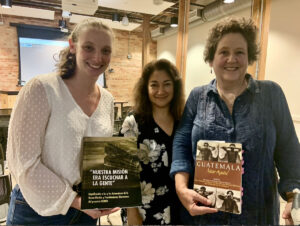 UNC Ph.D candidate Emily Taylor has learned a lot over the course of her doctoral studies. She is an expert in the history of the Civil War in Guatemala, a conflict that spanned from 1960 to 1996 and continues to have a ripple effect on the country to this day. Emily has also become well-versed in many other aspects during her PhD, including community building and engagement in both Guatemala and here at home in Chapel Hill. She spoke to me about how her work in the community at home and abroad has enriched her studies.
UNC Ph.D candidate Emily Taylor has learned a lot over the course of her doctoral studies. She is an expert in the history of the Civil War in Guatemala, a conflict that spanned from 1960 to 1996 and continues to have a ripple effect on the country to this day. Emily has also become well-versed in many other aspects during her PhD, including community building and engagement in both Guatemala and here at home in Chapel Hill. She spoke to me about how her work in the community at home and abroad has enriched her studies.
Emily’s research mainly focuses on women’s political activism during the Guatemalan conflict, with a focus on social movements and political memory. Her dissertation, tentatively titled “‘We Have Made the Government Tremble:’ Gender and Ethnicity in the Guatemalan Popular Movement, 1976-1996,” centers gender and indigenenaity, as well as the intersection between them in order to better understand the Guatemalan conflict. She was the recipient of a Fulbright Hayes DDRA Fellowship in 2022, which allowed her to spend a year in the field undertaking both archival research and oral interviews. She completed 40 interviews in English, Spanish, and K’iche’, a Mayan language spoken by the K’iche’ people of Guatemala. Emily also spent countless hours in a number of archives on the ground. Her oral interviews included a discussion with the co-founder of the group at the center of her dissertation Grupo de Apoyo Mutuo, which took her almost a year to secure. “I’m really lucky I am able to work on a topic where people are still living so I can ask them about their experiences,” she reflected, “It allows me to access other parts of history that aren’t available in the archive. It’s just so different than a material source.”
One aspect of Emily’s research that brought her closer to the Indigenous communities she studies was her language skills in K’iche’. Through support from UNC and Duke, she was able to begin her language studies in Nahualá in the highlands of Guatemala. Emily cites her experience connecting to the community as one of the most impactful things she has done in the field – “People really appreciate the effort being put in to speak with them in their native language,” she commented, “It also gives me a different perspective on Guatemala and Latin America, and helps me to center Indigenous voices in my work.” When she returned from her studies in Nahualá in 2020, she helped to found a K’iche’ language group that meets once a week to practice the language in conjunction with a teacher living in Nahualá. Emily had already developed a relationship with her teacher in Guatemala, and was able to continue working with her through the utilization of tools such as Zoom to foster remote learning. She cites the cultivation of this language group as a way to build community with other K’iche’ speakers in the United States. Emily is coordinating a speaking tour for her teacher, Ms. Tahay, which will span 6 states including North Carolina. She will be in the Triangle from February 22nd-26th, 2024.
 Upon returning to North Carolina this year, Emily has found ways to engage with her local community using her skills and research experience. While she is currently working on writing her dissertation, she also prioritizes using her knowledge of Guatemala to connect and educate. This fall, Emily was invited to be a speaker at the Rights! Camera! Action! Film Series sponsored by the Duke Human Rights Center at the Franklin Humanities Institute. The annual series highlights films that draw attention to human rights issues, followed by panel discussions to further discuss the important themes of the film. Emily was invited to help contextualize “The Art of Political Murder,” a film about Juan Gerardi, a Bishop who was murdered after reporting the atrocities committed by the state during the Guatemalan Civil War. She joined other human rights expects, including Duke Human Rights Center Director Robin Kirk, on a panel before the film, helping to contextualize the significance of the film and the conflict in Guatemala.
Upon returning to North Carolina this year, Emily has found ways to engage with her local community using her skills and research experience. While she is currently working on writing her dissertation, she also prioritizes using her knowledge of Guatemala to connect and educate. This fall, Emily was invited to be a speaker at the Rights! Camera! Action! Film Series sponsored by the Duke Human Rights Center at the Franklin Humanities Institute. The annual series highlights films that draw attention to human rights issues, followed by panel discussions to further discuss the important themes of the film. Emily was invited to help contextualize “The Art of Political Murder,” a film about Juan Gerardi, a Bishop who was murdered after reporting the atrocities committed by the state during the Guatemalan Civil War. She joined other human rights expects, including Duke Human Rights Center Director Robin Kirk, on a panel before the film, helping to contextualize the significance of the film and the conflict in Guatemala.
Emily has also dedicated her time to working as an expert witness in asylum cases for the UNC immigration legal clinic. The clinic aids asylum seekers by representing them in humanitarian immigration cases with help from expert witnesses in a variety of fields. She cites this work as some of the most impactful she has done, and hopes to use her knowledge to make a difference in someone else’s life. “The immigration system is very hard to navigate and always in flux,” she said “I can use my research skills to hopefully push forward these cases.” Emily’s expertise on the historical context of political conflict in Guatemala as well as current political happenings make her an excellent candidate to speak on these cases – the Civil War in Guatemala continues to have effects on the country that contribute to migration to the United States. By contextualizing situations where there is a threat of harm upon return to Guatemala, Emily is able to help a judge make an informed decision if needed. “It’s heartbreaking to see the many ways that the shadow of the war continues to haunt Guatemala, so being able to give back in some way makes me feel like my work has an impact outside of the academy.”
What’s next for Emily? Besides teaching her own course this Spring and continuing to write her dissertation, she plans on presenting her research findings at the annual Latin American Studies Association conference in Bogotá, Colombia this summer. She has also been working on sharing her expertise with a wider audience, including two online articles published about the recent Guatemalan elections. Above all, Emily is continuing to center her relationships and community engagement alongside her research and writing: “I want to give back in my own way after so many resources were invested into my education. Deep relationships and community are really what ground me in this work.”
-Dani McIvor
